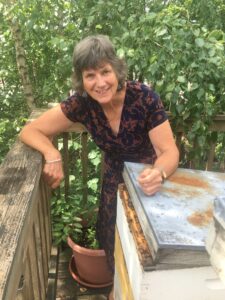By Peg Lopata, Contributing Writer

CAMBRIDGE – Napoleon derogatively called England a “nation of shopkeepers.” It might be more apt to call this small island a nation of agriculturalists, since they seem to have animal husbandry, gardening and farming in their blood. Right in the midst of a city locale, for example, there’s native of England, Helen Palmer, 75, raising bees―50,000 of them on her back deck in Cambridge, to be specific.
Early years
Palmer is from a small town. After eight years at a girl’s boarding school and then getting her degree in English and drama at the University of Bristol, she worked as a reporter at the BBC. At 38 she moved to Berlin.
“West Berlin was still a fascinating capitalist island marooned in East Germany,” explained Palmer.
Career in US media
Palmer emigrated to the United States when she was 41. She’s hard put even today to decide if it was the best or worst decision she ever made.
“Leaving my home country may have been the biggest mistake I’ve made so far in life,” she admitted, “but it could also be the best decision I ever made!”
Palmer’s background of fifteen years with the BBC doing practically every job there in radio well prepared her for work in American media. When she moved here, she worked freelance for the BBC and NPR, then joined WGBH’s Marketplace and after that produced their environmental program, “Living on Earth.”
She is also a mom―Palmer considers this her greatest accomplishment, alongside making radio documentaries about the Fall of Berlin in 1945 and the 50th anniversary of the 1936 Berlin Olympics. In 2017 she retired.
An active retirement
Palmer wasn’t the type to sip endless cups of tea, listen to bees hum, and jar honey. Because she believes in the importance of doing a good turn, volunteering is now a big part of her life―in fact, a favorite part of her life, especially working for the Boston Area Gleaners. Perhaps that propensity towards gardening strikes again in her very British soul.
And then there’s the bees, which despite being allergic to their bites and stings―she says she swells up like the Elephant Man―she avidly enjoys, even though for Palmer it involves dressing up in something akin to an astronaut suit.
She doesn’t find bees much work at all, needing only to check on them for diseases or to see if they have enough space.
“They’re so wonderfully self-organizing that you can happily leave them alone,” she said. However, there is some messy work when you harvest their honey. “You load the frames into a centrifuge which you spin furiously to extract all the honey,” Palmer related. “Honey drips everywhere―on your hands, your clothes, the floor, the door handles―it’s a nightmare, if a very sweet one.”
The bounty of beekeeping
After the nightmare, comes the best part. “I love to give people honey―it’s a truly personal Christmas present,” she said. “And also, one has to hope it’s helping nature in some way. After all, bees pollinate at least a third of all the food we eat, particularly fruits and vegetables.”
If she’s got a surplus of honey, Palmer sells it, giving the proceeds to various food charities, such as Food for Free in Cambridge, and the Greater Boston Food Bank.
RELATED CONTENT:
Feeding hungry folks is a lifelong mission for Catherine D’Amato (fiftyplusadvocate.com)
Cambridge publisher brings the joys of books to kids (fiftyplusadvocate.com)
Milford woman cleans her way into love for teaching yoga (fiftyplusadvocate.com)












